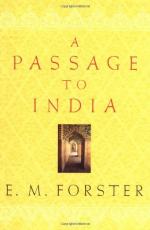|
|
A Passage to India Objects/Places
Chandrapore: The city in India where the novel takes place. It is a part of British India. In the center of the town is the British club, which excludes Indians from membership.
Marabar Caves: The caves in the Marabar Hills, which Aziz promises to show Mrs. Moore and Adela. The picnic at the caves leads to the infamous incident in which Adela accuses Aziz of improprieties. 'Caves' is the title of the second part of the novel and represent the conflict between British and Indians.
Mosque: Mrs. Moore and Aziz meet at the Mosque and start their friendship. While the caves represent disunion between British and India, the Mosque (the title of the first part of the novel) represents a union.
Bridge Party: Turton’s attempt to bring together British and Indians in a social setting. The party is superficial and unsuccessful.
Wife’s Photograph: Showing Fielding the photograph of his dead wife is Aziz’s way of lifting the purdah [separation of women and men]. By doing this he tries to promote a brotherhood between them.
Ghost: Part of the mysticism of India. Mrs. Moore believes she sees one, as she becomes more spiritually inclined. Aziz believes that believing in ghosts is a defect of Indians and sees it as backwards.
Echoes: The haunting sounds that are heard in the caves and afterwards, heard by Adela and Mrs. Moore. The echoes remain in Adela’s head after the picnic and only when she exonerates Aziz do they go away. For Mrs. Moore, the ‘boum’ sound of the echoes replace her memory of religious verses and prayers.
Purdah: The tradition Indian separation and veiling of women. It is forbidden for a man to see another man's wife's face, unless they are brothers. Dr. Aziz first goes against purdah when he shows Fielding a photograph of his deceased wife. He then calls Fielding his brother, and Fielding asks if purdah will be removed when all men are brothers. Later on, Dr. Aziz writes that the institution of purdah stands in the way of India's freedom.




